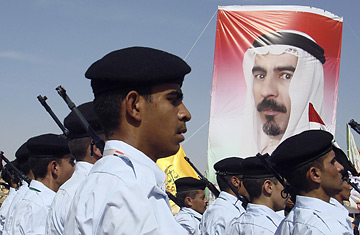
Iraqi policemen march past a poster of the late Abdul Sattar Abu Risha, October 23, 2007, who was killed in a bomb attack in Ramadi in September.
Osama bin Laden's latest call for Iraqi insurgents to unite against Americans fell on deaf ears this week in Ramadi, the city that al-Qaeda leaders once declared the seat of a new Islamic caliphate and capital of the Iraqi insurgency. Rather than rise up against them, the people of Ramadi Tuesday invited U.S. forces to watch a massive parade — albeit one so tightly secured that no pedestrian traffic got close to it. The almost surreal, two-hour martial procession was led by the city's children to commemorate the martyred leader of a tribal revolt that has virtually silenced al-Qaeda in Anbar Province. It gave the Baghdad government a photo-op to make points about national unity, and so the Shi'a dominated government sent a representative to Sunni Ramadi. "With unity, victory is possible," said Iraqi Defense Adviser Mowaffak al Rubaei, clearly referring to bin Laden's attempt to drum up support for a renewed anti-American uprising.
Tuesday's two-hour convoy — which wound through more than four miles of bullet- and bomb-ridden city decimated by the very worst of the war — celebrated the life of Ramadi's favorite son, Sheik Sattar Abu Risha, the romantic icon of the region's sudden turn against al-Qaeda and Islamic extremists. Though Sattar was killed by an insurgent's bomb on Sept. 13, his "Awakening" movement lives on and his image adorned police cars, armored vehicles and city walls for Tuesday's parade marking the end of 40 days of mourning. Hundreds of Iraqi police officers and soldiers beamed as they passed the reviewing stands manned by tribal sheiks, military brass and civilian leaders at the Government Center.
There was a lot of trepidation. Ramadi's civilian crowds, who remained out of sight to both the media and the VIPs, were held back for several city blocks from the actual perimeter of the parade for fear of a bomb or other attack. No explosions occurred, but without crowds, the entire event seemed merely a dress rehearsal staged for the benefit of the dignitaries and press, a marching band playing to empty streets. Military officials joked nervously about the possibility of venturing out of the secured area around Government Center to get a sense of the general turnout. American and Iraqi snipers poked above the tops of war-torn buildings for blocks in all directions. No one seemed to be taking any chances even as the event was being sold as a celebration of Ramadi's turnaround.
Marines and soldiers who work in the region every day said they've witnessed a sea change and welcomed the celebration. "I've seen the full transformation of Iraq," said Marine Warrant Officer Bobby Garza, who works on a team of 40 U.S. advisers helping train a 9,000-man Iraqi Army battalion near Ramadi. Garza said he's working on the second half of his fourth tour in Iraq. "It's a beautiful thing," he said from his spot on a wall outside Government Center, which was the focus of al-Qaeda attacks for most of the last four years. "We wouldn't have been sitting here doing this in January. No way," he said. "But just in a blink of an eye you could see this place change. The people just switched and wouldn't let [al-Qaeda] back into their communities. It's wild."
Tribal leaders, local officials and a coterie from the Maliki government waved and clapped from the viewing box above the street, under a door-sized poster of Sattar, flanked on one side by an Iraqi flag and on the other by the yellow flag of the "Iraqi Awakening." Before Sattar was killed last month, he broadened his ambitions and his claims of authority to include all of Iraq. Al Rubaie hailed that spirit and pledged the central government would support it locally with funds, security forces and other assistance to develop the region and tie it more firmly with Baghdad. After the parade, al Rubaie sat comfortably as the head guest of Sattar's brother, Sheik Ahmed Abu Risha, who took over the Awakening movement after Sattar's death. Older and rounder than his warrior brother, Ahmed seemed more like a middle-aged businessman. He and the other sheiks skipped over the talk of security and moved right on to the issues of reconstruction and governance — until someone asked if he still feared al-Qaeda.
"Al-Qaeda never wanted to see the sons of Anbar to unite and form security forces. Now I think we have broken their back by building the police and security force," he said, adding that he was not afraid of meeting the same fate as his younger brother Sattar. "Let them come forward and show their faces.... Let them come out, we will fight them," he said with a certain swagger before leaving. His younger brother had said something similar several days before he was killed in September. But al-Qaeda's presence has dwindled dramatically since then, officials say. "Insha'allah" — God willing — an Army captain said.
